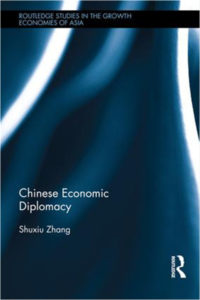
Chinese Economic Diplomacy: Decision-making actors and processes
Shuxiu Zhang
Routledge (2016)
Rs15,288
Economic diplomacy was declared in 2013 by Beijing as a priority in its “comprehensive” strategy for diplomacy. The political elite undertook to further invest in economic diplomacy as an instrument for economic growth and development. Globally, Chinese cooperation in multilateral economic processes has become critical to achieving meaningful outcomes. However, little understanding exists in current literature on the factors and mechanisms which shape the processes behind China’s economic diplomacy decision-making.
Chinese Economic Diplomacy provides an understanding of the processes and practices of China’s economic diplomacy, with multilateral economic negotiations as the primary basis of analysis, specifically the UN climate change talks and the WTO Doha Round trade negotiations. It examines how early economic diplomacy in global governance contributed to the varied and evolving nature of its present-day decision-making structures and processes. Demonstrating how China’s negotiation preferences are driven by networks of political actors in formal and informal domestic and systemic environments, it also highlights the capacity of international negotiation practices to alter and re-shape China’s approach to multilateral economic negotiations. As a consequence, the book presents a framework for understanding China’s economic diplomacy decision-making processes that is systemically constructed by domestic and international agencies.
Offering a Chinese perspective of the notion of economic diplomacy, this book will be of interest to students and scholars of Chinese Economics, International Relations and Political Economy.
Shuxiu Zhang is Visiting Fellow at the International Trade Policy Unit, London School of Economics and Political Science, UK. Her research interests include economic diplomacy decision-making processes and the Chinese political economy.
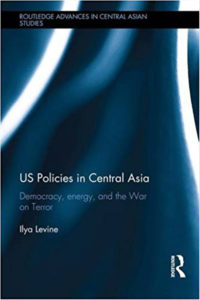
US Policies in Central Asia: Democracy, Energy and the War on Terror
Ilya Levine
Routledge (2016)
Rs15,288
Democracy promotion, security and energy are the predominant themes of US policy in Central Asia after the Cold War. This book analyses how the Bush administration understood and pursued its interests in the Central Asia states, namely Kyrgyzstan, Tajikistan, Kazakhstan, Uzbekistan, Turkmenistan. It discusses the shift in US interests after September 11 and highlights key ideas, actors and processes that have been driving US policy in Central Asia. The author examines the similarities between the Bush and Obama administrations’ attitudes towards the region, and he points to the inadequacy of the personality focused, partisan accounts that have all too often been deployed to describe the two presidential administrations. To understand US Central Asian policy, it is necessary to appreciate the factors behind its continuities as well as the legacies of the September 11 attacks.
Using case studies on the war on terror, energy and democracy, drawing on personal interviews with Americans and Central Asians as well as the fairly recent releases of declassified and leaked US Government documents via sources like the Rumsfeld Papers and Wikileaks, the author argues that the US approached Central Asia as a non-unitary state with an ambiguous hierarchy of interests. Traditionally domestic issues could be internationalised and non-state actors were able to play significant roles. The actual relationships between its interests were neither as harmonious nor as conflicted as the administration and some of its critics claimed.
Shedding new light on US relations with Central Asia, this book is of interest to scholars of Central Asia, US Politics and International Relations.
Ilya Levine received his Ph.D. in International Relations from the University of Melbourne, Australia. His research interests include US foreign policy, Russian politics, and Central Asia.
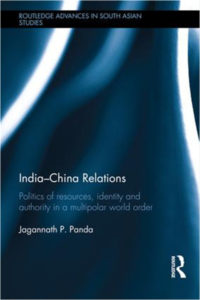
India-China Relations: Politics of Resources, Identity and Authority in a Multipolar World Order
Jagannath P. Panda
Routledge (2017)
Rs15,288
The rise of India and China as two major economic and political actors in both regional and global politics necessitates an analysis of not only their bilateral ties but also the significance of their regional and global pursuits. This book looks at the nuances and politics that the two countries attach to multilateral institutions and examines how they receive, react to and approach each other’s presence and upsurge.
The driving theme of this book is to highlight the enduring and emerging complexities in India-China relations, which are multi-layered and polygonal in nature, and both a result and reflection of a multipolar world order. The book argues that coexistence between India and China in this multipolar world order is possible, but that it is limited to a medium-term perspective, given the constraints of identity complexities and global aspirations these two rising powers are pursuing. It goes on to discuss how their search for energy resources, quest to uphold their own identity as developing powers, and engagement in balance-of-power politics to exert authority on each other’s presence, are some elements that guide their non-cooperative relationship.
By explaining the foreign policy approaches of Asia’s two major powers towards the growing Asian and global multilateralism, and highlighting the policies they carry towards each other, the book is a useful contribution to students and scholars of Asian Politics, Foreign Policy and International Relations.
Jagannath P. Panda is a Research Fellow and Coordinator of the the East Asia Centre at the Institute for Defence Studies and Analyses, New Delhi, India.
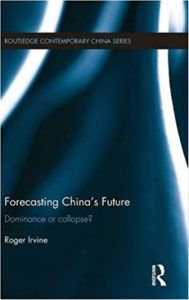
Forecasting China’s Future: Dominance or Collapse?
Roger Irvine
Routledge (2015)
Rs15,288
China’s future development is likely to have a huge impact on twenty-first century global outcomes. It is therefore surprising that, thus far, so little attention has been given to comparing and evaluating expert forecasts of China’s future in the post-Mao era.
This book presents an illuminating and comprehensive summary record of contrasting and competing expert forecasts and judgements about the major issues confronting China within four principal domains – political, economic, environmental, and international. After considering the principal forecasting methods available to experts, the author comments critically on the degree of success achieved in using those methods and emphasises the confusion created by the polarisation of opinion and by the failure of many experts to accept the high degree of uncertainty that characterises most of the key issues. The book recommends a new approach based on the study of a hierarchy of critical uncertainties and on continuing analysis of opposing expert opinions about these uncertainties. It emphasises the potential for both positive and negative outcomes for these critical uncertainties, and the importance of maximising the potential for positive outcomes through improved analytical and policy frameworks.
Providing insights for specialists and non-specialists into the most critical issues that will determine China’s future direction, this book will be of particular interest to students and scholars of political, economic, environmental, and international relations issues in China and Asia, as well as to readers in business and government.
Roger Irvine is a Visiting Research Fellow at the University of Adelaide, South Australia. He was a visiting scholar at Tsinghua University, China during 2010 and at National Chengchi University, Taiwan during 2014.
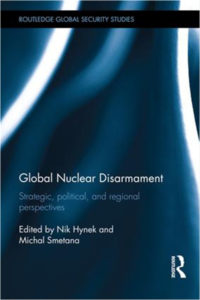
Global Nuclear Disarmament: Strategic, Political, and Regional Perspectives
Eds Nik Hynek, Michal Smetana
Routledge (20160
Rs16,137
This book examines the issue of nuclear disarmament in different strategic, political, and regional contexts.
This volume seeks to provide a rich theoretical and practical insight to one of the major topics in the field of international security: global abolishment of nuclear weapons. Renewed calls for a nuclear weapons-free world have sparked a wide academic debate on both the attainability of such goal and the steps that should be taken. Comparably less attention, however, has been paid to theoretically informed considerations of the consequences of nuclear abolition. Comprising essays from leading scholars and experts within the field, this collection discusses the fundamental theoretical and conceptual foundations of nuclear disarmament and subsequently tries to assess its hypothetical impact in global and regional contexts. The varied methodological approach of the contributors aims to advance a multi-theoretical and multi-perspectival view of the issue. The book is organized in three main sections: ‘Strategic Perspectives’, dealing with the specific constraints and facilitators for the states to achieve their core objectives; ‘Political Perspectives’, with the focus on the power of norms, belief-systems and ideas; and ‘Regional Perspectives’, with the analyses of seven regional and/or state-specific nuclear contexts. As a whole, the volume provides a detailed, complex overview of the risks and opportunities that are embedded in the vision of a nuclear weapon-free world.
This book will be of great interest to students of nuclear proliferation, arms control, war and conflict studies, international relations and security studies.
Nik Hynek is Associate Professor at the Metropolitan University and Charles University Prague, Czech Republic. He is the author or editor of several books, including Human Security as Statecraft (Routledge 2012) and Statebuilding in Afghanistan (co-editor, Routledge 2011).
Michal Smetana is Lecturer and Research Associate at the Institute of Political Studies, Charles University in Prague, Czech Republic.

